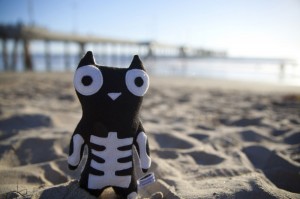School art project inspires crafty business venture
It’s another typical school morning for Plinio Garcia and Andrew Ruesch. The partners hurry into Franceil Masi’s kindergarten classroom with their two children in tow, making sure their kids are situated OK in the morning rush.
But then, rather than leave, they turn to greet Masi in winded, yet cheery voices. They chat for a moment about their lives and children, but then the conversation turns to talking shop.

Indy art · Indy Plush began after teacher Franceil Masi had her students create plush toys. One of her students showed his creation to his parents, who then contacted Masi to see if she wanted to start a business with them. – Courtesy of Indy Plush
Garcia and Ruesch don’t have a typical parent-teacher relationship with Masi. The trio are the creative minds behind plush toy business, Indy Plush, a business inspired by a class art project that Masi started with her third graders.
Prior to Indy Plush, Masi, a Florida-native and USC alumna, had been working and creating illustrations for various children’s books. After completing a children’s book entitled Kilkenny Cats, a colleague suggested she create her own cat plush toy based off of the book. From there, Masi’s relationship with plushes was born.
Masi began having her third-grade students make plush toys, teaching them how to sew and cut. Then she had them draw the toys, which Franceil would soon create for them.
“I wanted to make the kids do it because it was a good way to get them moving their hands and creating and putting art in the classroom, and that’s how it evolved,” Masi said.
Then Garcia and Ruesch’s son, Luke, joined Masi’s class last fall. Like every other student, Luke created a drawing that Masi brought to life as a plush toy. When Luke brought his new stuffed dog home with him one day, Garcia and Ruesch were astounded.
“From a benevolent, academic, philanthropic, creative perspective, the fact that she would have kids draw drawings and interpret them and give them back for free is amazing,” Garcia said. “For a teacher to take the time and do that is amazing. Kids actually see what they draw come to life — it gives them a whole different appreciation and inspiration.”
At that moment, Garcia and Ruesch knew they wanted to start a business with Masi.
“He’s 25 and I’m 52, and so if we both agree on something, it’s a go,” Garcia said.
After a bit of hesitation and negotiating, Masi finally agreed.
When they started out, the three co-owners agreed that they wanted to create an environmentally friendly business. Because of that, all of their materials are sourced locally, their fabrics are sustainable and the stuffing used in their plush toys is made of recycled plastic bottles.
“We agreed the company needed to have all the ingredients of what’s right,” Garcia said.
Because of their work, they have earned a Green American certification, distinguishing Indy Plush as a recognized environmentally and socially responsible business.
On top of making a huge effort toward a 100-percent environmental initiative, Indy Plush products are made entirely in the U.S., helping the economy “one toy at a time.” However, acquiring materials made in America has proven to be Indy Plush’s biggest challenge.
“They closed the mills in North Carolina and Downtown that makes fleece, so now [we] can’t even buy [colored] American-made fleece,” Ruesch said.
The three overcome the challenge of domestic sourcing with a lot of patience, first and foremost, and continuously are looking to figure out other options where they can source their materials from. For better or for worse, sourcing locally causes costs to rise high above their competitors’.
“It’s a huge price difference, and that’s what we find hard in just selling our product altogether because we have to educate the consumer at the point of sale,” Ruesch said.
Not only do people at Indy Plush educate their consumers on their prices, but they also try to educate their young customers. The Indy Plush trio hopes the company’s environmentally friendly values will carry over to their consumers’ lifestyles.
“We want to give values to children that matter. We’re bringing back the value and concept of ‘reduce, reuse, recycle,’” Garcia said. “Let’s protect our product, let’s protect the earth, let’s protect everything.”
One way they are putting a spotlight on environmental issues is by having a line of endangered species plushes, complete with tags that share facts about each animal, including the remaining population count.
Another value they tirelessly preserve is Masi’s freedom as an artist. The small business spends tens of thousands of dollars trademarking Masi’s art in order to protect her work, Masi said.
“Plinio lets me have range, and I do whatever I want, and I’m very happy with it,” Masi said.
Masi still has her students draw and make plush toys, carrying on her tradition of encouraging kids to create their own crafts. But the company is also starting to make its move beyond the toy realm.
“We have three books coming up, but we agreed they have to be educational,” Ruesch said.
Already, though, the trio’s “plush couture” (as Plinio put it) seems to be everywhere. With more products on the way, this environmentally conscious idea seems poised to continue to grow. Perhaps, as it gains popularity, Indy Plush’s message will also spread with the product.
